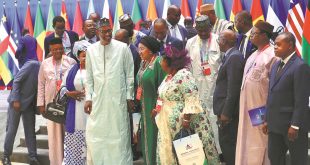Published: Feb 03,,2024
By Song Wei

The US Secretary of State Antony Blinken started a week-long tour to Africa on January 22. Many media have noted that his visit was arranged just after Chinese Foreign Minister Wang Yi’s first visit to Africa in the new year. This choice of timing also makes the torn attitude of the US towards China-African relations all the more intriguing, that is, the US not only cooperates with the Western media to hype Africa’s waning focus on China to cool down, but also constantly keeps an eye on China and closely follows China’s pace in Africa. Both the public opinion offensive and forced policies toward Africa by the US reflect the competition-driven nature of the US’ positioning in Africa, but the US’ African policies designed to exclude China are also of no avail in restoring the country’ sfractured relationship with this continent.
A plain fact is that Africa is still not a strategic priority for the US. The spokesman for the US Department of State (DoS) said that Blinken’s visit to Africa this time aims at highlighting their strategic intention to accelerate building partnership with Africa and their plan to invest in African infrastructure, in a bid to promote mutual trade and create job opportunities in the US and Africa, helping Africa in the aspects including competing in the global markets.
The pitch is quite high, but the DoS did not forget to emphasize that Blinken will closely observe and coordinate the situation in the Middle East during his African visit. Africa has still not been given strategic precedence by the US. The country has never been shy about the fact that African issues are difficult to garner their favor due to geopolitical, business environment and other reasons. This is also an important reason why US President Joe Biden failed to fulfill his promise to visit Africa in 2023.
Washington’s core concerns are actually staying fixated and launching targeted strategic competition against China. Despite the US’ claim that “If China didn’t exist, we would be fully engaged in Africa”, few people believe this. The US political and academic circles have long advocated that China is their biggest and longest-standing competitor in Africa, and China’s influences in the continent have continuously grown over the past two decades, so they must act to contain China.
Although Blinken’s trip deliberately showed the milder side of the US by arranging activities such as supporting the Africa Cup of Nations, the US side makes no secret of talking about the issue of expecting African countries to take sides, and intentionally discloses beforehand to drive a security partnership based on common values including respecting human rights, promoting democracy and expanding the rule of law when discussing economic growth issues with African countries.
The US has been consistently imposing carrot-and-stick approaches on developing countries. However, with steady progress in foreign development and cooperation, Africa has gradually shed its dependent position. As the Global South countries emerge extensively, African countries have increasingly diversified options in financing for development and enhanced bargaining power.
For Africa, how to push post-pandemic recovery and development is a test for every country, and how to build sustainable and mutually beneficial development partnerships is the key to success in addressing development challenges. Unlocking development bottlenecks requires more sincere and sustained planning rather than being forced to take sides, which is the fundamental reason why it is difficult for the US to woo Africa.
Some media have recognized that Blinken’s African visit carries with it concerns about African security, which is believed to be motivated by elements related to Russia. The security of Africa has long not been among the major concerns of the US, which explains to a large extent why the anti-terrorist situation in Africa has not changed significantly since the high-profile establishment of the US Africa Command (AFRICOM).
However,even before Blinken’s trip, the US began to emphasize its concerns about the security situation in the Sahel region and off the coast of West Africa. Just last week, representatives of Niger’s military council, which took power after a military coup last year, visited Russia and reached a military cooperation development agreement with the latter. This was regarded by the US as a serious challenge to its authority from Russia. The US’ particular statement to monitor the security situation in West Africa this time obviously aims at eroding Russia’s influences in Africa rather than promoting the security and stability of the continent.
As is said by some US and European media, the visit to Africa by the US Secretary of State clearly targets China and Russia. The US’ attention to beware of China is especially obvious. At the same time, their sincerity in developing relations with Africa has again faced skepticism. The US still fails to break away from its competition-driven Africa strategy, but it cannot be more familiar for Africa. Amidst the ascent of Global South countries, the strategic focus of Africa has been further strengthened, thereby only rendering the political intimidation and economic enticement of the US more ineffective.
The author is a professor and doctoral supervisor of the School of International Relations and Diplomacy, Beijing Foreign Studies University.
Editor’s note: Originally published on opinion huanqiu.com, this article is translated from Chinese into English and edited by the China Military Online. The information and opinions in this article do not necessarily reflect the views of africachinareview.com
 Africa -China Review Africa -China Cooperation and Transformation
Africa -China Review Africa -China Cooperation and Transformation
